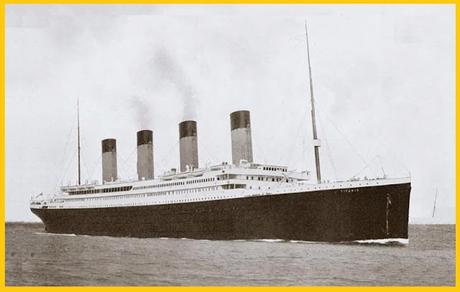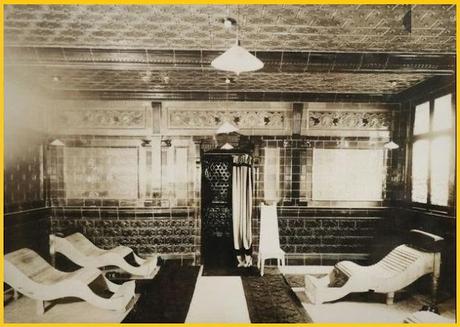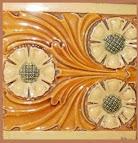When the owners of the White Star Line advertised for staff to work in the Turkish Baths aboard their new luxury flagship the Titanic, Len saw and took his chance. This was branching out in style. It was a dream job, a life on the ocean waves on board a magnificent liner, and with an opulent clientele to cater for. He joined the crew at the beginning of April 1912 and acquainted himself with his new domain, the First Class Turkish Baths on F Deck on the starboard side of RMS Titanic.
The "latest wonder of the world" set out on her maiden voyage from Southampton bound for New York later that month on April 10th. But after only five days, both the maiden voyage and Len's new job came to an abrupt and cataclysmic end out in the north Atlantic. Titanic was supposed to be "unsinkable." Not so, as the "intimate welding" of ship and iceberg proved. Two thirds of the passengers and three quarters of the crew lost their lives, Len Taylor among them. An unposted letter home was all that survived him. I've imagined its contents further on.

RMS Titanic
I first heard Fred and Len's story back in 2014 when I was involved in a poetry project connected to Blackpool's Imperial Hotel. Some renovation work in the hotel's basement had recently uncovered sections of the Baths complex. The whole hydropathic area of Turkish Baths had been closed down and all but forgotten about decades ago. All the piping and venting had been ripped out, the beautiful tiled walls had been thickly plastered over, and the intricate mosaic floors had been smothered in asphalt when the area had been converted into store rooms some seventy years before. Now Blackpool Civic Trust was embarking on a painstaking three-year project to remove the plaster and asphalt and reveal and restore what was left of the stunning late-Victorian workmanship that had gone into creating the Imperial Hotel's Baths complex.
part of the original Baths complex at Blackpool's Imperial Hotel
Turkish Baths became very popular in late Victorian and early Edwardian England and many prestigious hotels of the period introduced them as an inducement to their visitors to pamper themselves, relax, get the industrial grime out of their pores, feel healthier, happier and wealthier. It was one up from 'taking the waters' in Spa towns. The complex at Blackpool's Imperial Hydropathic Hotel (to give it the title it deserved in 1898) differed from many in other cities in that it used seawater. This it took not directly from the sea but from a large storage tank nearby into which the seawater was pumped daily and thence fed to the hotels on the front offering hydropathy. (The Imperial wasn't the only one, but it was the grandest.)The facilities comprised a steam room, a cooling room, an ice plunge and a massage room. All the ceilings, walls and floors had to be water-proof and steam and water resistant, so what the Civic Trust uncovered was vast areas of beautifully designed, coloured and glazed decorative tiles (as can be seen in the photograph above) of a type known as Burmantofts because they were manufactured at the Burmantofts Pottery in Leeds. Their renovation work concluded in 2017 and although the rooms are no longer serviceable as Turkish Baths, enough has been restored to give visitors to the hotel a glimpse of that Victorian splendour.
It was the Manageress of the Imperial Hotel who kindly provided me with the background on Fred Taylor, his Turkish Baths and the harrowing story of his son Len, when she was describing the plan for the renovation project - and now seven years later I've taken what she told me as the branching out point for this latest composition from the imaginarium. You've got to feel for Len and his awful watery fate. The only silver lining I can conjure up is the thought that he was perhaps spared an even more horrendous end in the Great War which was just over the horizon. RIP young Leonard Taylor.
From A Fortunate SonDearest mother and father,she's a beauty, this ship,a floating palace. I wishyou could see where I work:steam room, cold room, icy plunger, ventas grand as anything at the Hydro.
My hours suit me fine, the people are swell,that's the word everyone uses now;the tips are good and I'm thinkingof how much I shall be able to save,trip by trip, in pence and cents.Of course the air is bracing,and I'm getting used to this motionon the waves, the thrum of turbinesas we carve our wayacross the ocean which is huge,nothing to see but water all around.
And there's a girl I've met, Molly;her job's in the laundry. We go up aft on my break from thestream room, cold room, icy plunger, vent and share an American cigarette.I know you were sad to see me leaveand I miss you both and Blackpool too,but I feel the guiding hand of destiny.Next stop, New York, USA!Everybody says this is the futureand I'm living it. Be happy for me.
Your loving son Len,
Turkish Bath Attendant, RMS Titanic.

Thanks for reading, S ;-) Email ThisBlogThis!Share to TwitterShare to Facebook
